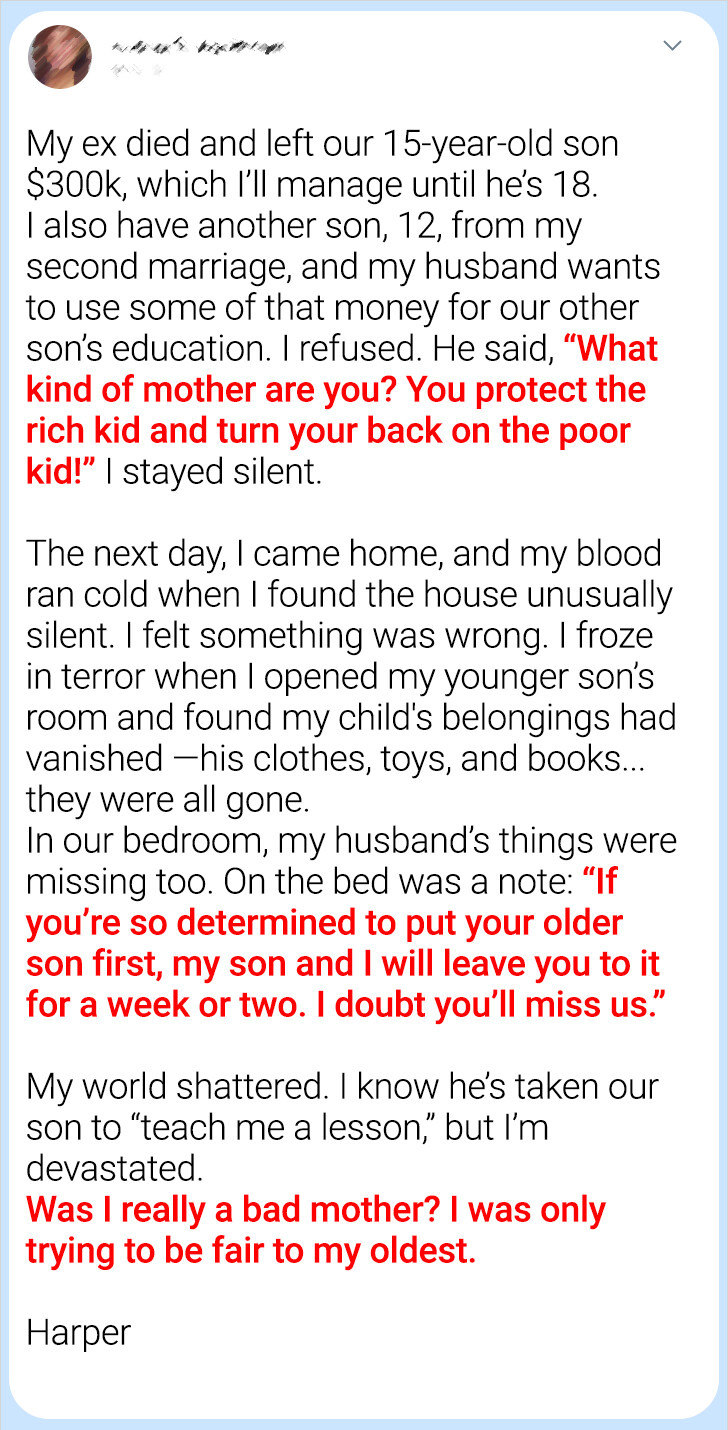I Refused to Share My Son’s Inheritance — Am I a “Bad Mother”? / Bright Side
Money often becomes a source of conflict in families, and the tension can be even greater in blended households. Harper found herself in a challenging situation when her eldest son, from a previous marriage, was set to inherit a substantial sum from his late father. Her current husband, however, believed that part of this inheritance should be shared with his own son.
When Harper stood her ground and refused, the disagreement escalated dramatically. Feeling overwhelmed, she decided to share her story and seek advice on how to navigate this sensitive issue.
This is Harper’s letter:

Hello Harper! Thank you for opening up and sharing your story. We’ve compiled some advice to support you as you work through this challenge.
Seek immediate legal guidance.
Since your husband has taken your 12-year-old son without your agreement, this could potentially fall under custody interference or even parental kidnapping, depending on your local laws. Consult a family lawyer immediately to understand your legal rights and options. Ensure your son is safe, as his well-being is the top priority.
The lawyer can also help mediate custody arrangements to prevent such drastic actions in the future and establish clear boundaries about how financial decisions like the $300k inheritance are handled.
Have a calm, honest conversation with your husband.
Once you locate your husband and son, arrange a private, face-to-face conversation in a neutral, safe space (possibly facilitated by a mediator). Focus on understanding his perspective without being defensive. Explain the legal and moral obligations tied to the $300k and why you felt it was important to honor that.
At the same time, acknowledge his feelings and discuss how you both can create a financial plan that supports both children without violating legal or ethical boundaries. Clear communication is critical to rebuilding trust.
Reassess the financial dynamics of your family.
Your husband’s frustration likely stems from feeling that the younger son is being overlooked. Explore alternative ways to address the education expenses for your younger child. Can you adjust your household budget to allocate funds for his education? Could you explore scholarships or educational assistance programs?
By proactively showing a willingness to find solutions for your younger son, you may demonstrate fairness while still preserving the inheritance for its intended purpose.
Consider family counseling to heal emotional wounds.
This incident has caused significant emotional damage to your family, particularly your relationship with your husband and younger son. Family counseling can provide a safe environment to work through the feelings of resentment, inequality, and misunderstanding.
A trained therapist can help you, your husband, and even your children better understand one another’s perspectives and create strategies to rebuild trust and cooperation within the family. This is especially important to ensure your younger son doesn’t feel neglected or unimportant moving forward.
Angelica discovered her ex-husband was using their child’s college fund for his stepdaughter. Determined to intervene, she uncovered a shocking truth that left everyone stunned. Read her incredible story here.






